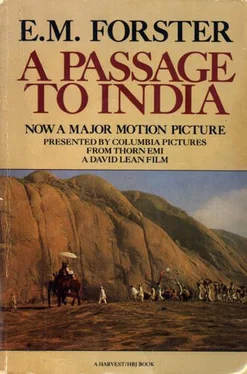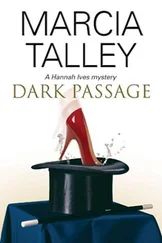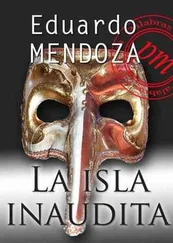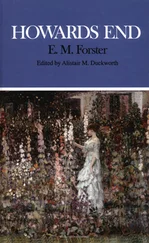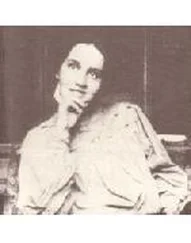While thinking of Mrs. Moore she heard sounds, which gradually grew more distinct. The epoch-making trial had started, and the Superintendent of Police was opening the case for the prosecution.
Mr. McBryde was not at pains to be an interesting speaker; he left eloquence to the defence, who would require it. His attitude was, "Everyone knows the man's guilty, and I am obliged to say so in public before he goes to the Andamans." He made no moral or emotional appeal, and it was only by degrees that the studied negligence of his manner made itself felt, and lashed part of the audience to fury. Laboriously did he describe the genesis of the picnic. The prisoner had met Miss Quested at an entertainment given by the Principal of Government College, and had there conceived his intentions concerning her: prisoner was a man of loose life, as documents found upon him at his arrest would testify, also his fellow-assistant, Dr. Panna Lal, was in a position to throw light on his character, and Major Callendar himself would speak. Here Mr. McBryde paused. He wanted to keep the proceedings as clean as possible, but Oriental Pathology, his favourite theme, lay around him, and he could not resist it. Taking off his spectacles, as was his habit before enunciating a general truth, he looked into them sadly, and remarked that the darker races are physically attracted by the fairer, but not vice versa —not a matter for bitterness this, not a matter for abuse, but just a fact which any scientific observer will confirm.
"Even when the lady is so uglier than the gentleman?"
The comment fell from nowhere, from the ceiling perhaps. It was the first interruption, and the Magistrate felt bound to censure it. "Turn that man out," he said. One of the native policemen took hold of a man who had said nothing, and turned him out roughly. Mr. McBryde resumed his spectacles and proceeded. But the comment had upset Miss Quested. Her body resented being called ugly, and trembled.
"Do you feel faint, Adela?" asked Miss Derek, who tended her with loving indignation.
"I never feel anything else, Nancy. I shall get through, but it's awful, awful."
This led to the first of a series of scenes. Her friends began to fuss around her, and the Major called out, "I must have better arrangements than this made for my patient; why isn't she given a seat on the platform? She gets no air."
Mr. Das looked annoyed and said: "I shall be happy to accommodate Miss Quested with a chair up here in view of the particular circumstances of her health." The chuprassies passed up not one chair but several, and the entire party followed Adela on to the platform, Mr. Fielding being the only European who remained in the body of the hall.
"That's better," remarked Mrs. Turton, as she settled herself.
"Thoroughly desirable change for several reasons," replied the Major.
The Magistrate knew that he ought to censure this remark, but did not dare to. Callendar saw that he was afraid, and called out authoritatively, "Right, McBryde, go ahead now; sorry to have interrupted you."
"Are you all right yourselves?" asked the Superintendent.
"We shall do, we shall do."
"Go on, Mr. Das, we are not here to disturb you," said the Collector patronizingly. Indeed, they had not so much disturbed the trial as taken charge of it.
While the prosecution continued, Miss Quested examined the hall—timidly at first, as though it would scorch her eyes. She observed to left and right of the punkah man many a half-known face. Beneath her were gathered all the wreckage of her silly attempt to see India—the people she had met at the Bridge Party, the man and his wife who hadn't sent their carriage, the old man who would lend his car, various servants, villagers, officials, and the prisoner himself. There lie sat—strong, neat little Indian with very black hair, and pliant bands. She viewed him without special emotion. Since they last met, she had elevated him into a principle of evil, but now he seemed to be what he had always been—a slight acquaintance. He was negligible, devoid of significance, dry like a bone, and though he was "guilty" no atmosphere of sin surrounded him. "I suppose he is guilty. Can I possibly have made a mistake?" she thought. For this question still occurred to her intellect, though since Mrs. Moore's departure it had ceased to trouble her conscience.
Pleader Mahmoud Ali now arose, and asked with ponderous and ill-judged irony whether his client could be accommodated on the platform too: eveii Indians felt unwell sometimes, though naturally Major Callendar did not think so, being in charge of a Government Hospital. "Another example of their exquisite sense of humour," sang Miss Derek. Ronny looked at Mr. Das to see how lie would handle the difficulty, and Mr. Das became agitated, and snubbed Pleader Mahmoud Ali severely.
"Excuse me—" It was the turn of the eminent barrister from Calcutta. He was a fine-looking man, large and bony, with grey closely cropped hair. "We object to the presence of so niany European ladies and gentlemen upon the platform," lie said in an Oxford voice. "They will have the effect of intimidating our witnesses. Their place is with the rest of the public in the body of the hall. We have no objection to Miss Quested remaining on the platform, since she has beeii unwell; we shall extend every courtesy to her throughout, despite the scientific truths revealed to us by the District Superintendent of Police; but we do object to the others."
"Oh, cut the cackle and let's have the verdict," the Major growled.
The distinguished visitor gazed at the Magistrate respectfully.
"I agree to that," said Mr. Das, hiding his face desperately in some papers. " It was only to Miss Quested that I gave permission to sit up here. Her friends should be so excessively kind as to climb down."
"Well done, Das, quite sound," said Ronny with devastating honesty.
"Climb down, indeed, what incredible impertinence!" Mrs. Turton cried.
"Do come quietly, Mary," murmured her husband.
"Hi! my patient can't be left unattended."
"Do you object to the Civil Surgeon remaining, Mr. Amritrao?"
"I should object. A platform confers authority."
"Even when it's one foot high; so come along all," said the Collector, trying to laugh.
"Thank you very much, sir," said Mr. Das, greatly relieved. "Thank you, Mr. Heaslop; thank you, ladies all."
And the party, including Miss Quested, descended from its rash eminence. The news of their humiliation spread quickly, and people jeered outside. Their special chairs followed them. Mahmoud Ali (who was quite silly and useless with hatred) objected even to these; by whose authority had special chairs been introduced, why had the Nawab Bahadur not been given one? etc. People began to talk all over the room, about chairs ordinary and special, strips of carpet, platforms one foot high.
But the little excursion had a good effect on Miss Quested's nerves. She felt easier now that she had seen all the people who were in the room. It was like knowing the worst. She was sure now that she should come through "all right "—that is to say, without spiritual disgrace, and she passed the good news on to Ronny and Mrs. Turton. They were too much agitated with the defeat to British prestige to be interested. From where she sat, she could see the renegade Mr. Fielding. She had had a better view of him from the platform, and knew that an Indian child perched on his knee. He was watching the proceedings, watching her. When their eyes met, he turned his away, as if direct intercourse was of no interest to him.
The Magistrate was also happier. He had won the battle of the platform, and gained confidence. Intelligent and impartial, he continued to listen to the evidence, and tried to forget that later on he should have to pronounce a verdict in accordance with it. The Superintendent trundled steadily forward: he had expected these outbursts of insolence—they are the natural gestures of an inferior race, and he betrayed no hatred of Aziz, merely an abysmal contempt.
Читать дальше
